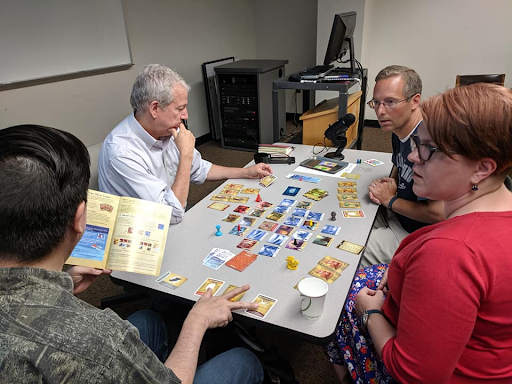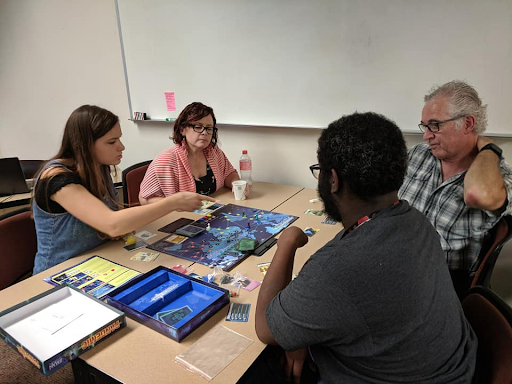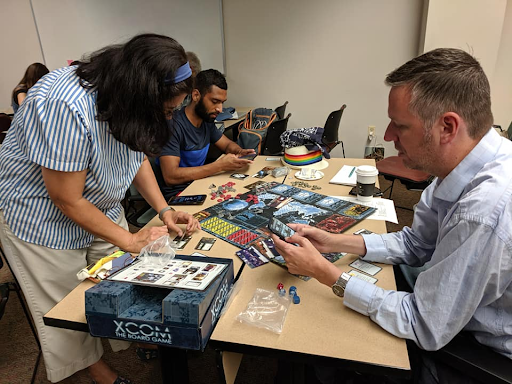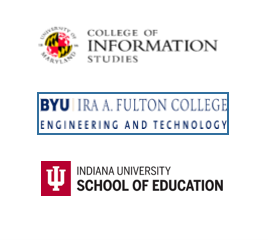Newsletter for NSF Award 1915563
This is the first project newsletter written after our project kickoff meeting July 19-20, 2019. Our plan is to issue newsletters every month or two to inform our advisory board, funder, and interested collaborators of our plans, progress, and challenges.
Careers in Play Is Our New Name
The project that we proposed to the National Science Foundation’s Improving Undergraduate STEM Education (IUSE) program was originally titled Collaboration in the Future of Work: Developing Playable Case Studies to Improve STEM Career Pathways. This three-institution collaborative project’s goal is:
Improve undergraduate STEM learning and career pathways for students from all backgrounds through the development and evaluation of enhanced Playable Case Studies.
A Playable Case Study (PCS) is a kind of alternate reality game that provides an immersive experience for players through a transmedia interface. We felt that the original name was pretty wordy and the shorter name of Careers in Play is aligned to our research goal and would work better for our communication.
Project Kickoff

On July 19 and 20th, the new project held its kickoff meeting at the University of Maryland with attendees from Indiana and Brigham Young University (BYU) and external evaluation company Rockman. Other participants using videoconferencing included four members from BYU in Provo, a UMD student in Indonesia, and the NSF program officer. The first day included presentations by Principal Investigators (PIs) and senior personnel and the second day was for the PIs and evaluator (Agenda) to plan next steps.
The meeting began with some short comments by Professor Keith Marzullo, Dean of the iSchool who commented on the nature of the National Science Foundation (NSF) programs and the review process used to ensure a high-quality match between policy needs and scientific research.
Beginning of the Project
This project is in its initial stages and one of the topics that was discussed was the project approach where we are and developing our initial team structure. Figure 1, below illustrates the initial timeline and project responsibilities.
In the coming weeks, the project teams will develop some initial goals for the coming fall semester.
There was some discussion of the similarities of the Information Sciences (IS) students across all three of our institutions as having similar academic profiles and challenges, including experiences as what students often describe as “Computer Science failures.” Even though Indiana is not planning to offer this PCS module, their undergrad population was also discussed and would appear to be similar in several ways with the populations in the study sites. There are other characteristics of many IS students that may exhibit academic behaviors such as absenteeism and uneven engagement that could challenge a team-based game that is designed around team participation and collaboration. These students when compared to some other majors at the University of Maryland are more likely to be working and commuting from home than having the benefit of close housing and ample financial resources.
Learning about Information Science Students

Game Play Design Review Session
A central part of this large group meeting was the evaluation of cooperative board games to understand and consider the game mechanics and how they might be applied to this project. The three games played were Pandemic, Forbidden Island, and XCOM The Board Game. Following the game play, there was a structured discussion where issues related to translation of a board game paradigm might occur into a classroom setting. Some important observations include:
· Game complexity/experienced students: Students with less experience can get overwhelmed easily. More experienced players can be bossy and take the fun out. Onboarding new players can take some effort to get players up to speed in terms of the gameplay, especially cooperative game novices.
· Game mechanics challenges. Evaluators wondered how the turn structure would translate to a classroom context and other aspects of the game. Many subsequent conversations considered different ways the different games might work in a classroom setting.
· Balancing realism and playability. This seems a core tension in the design process. The challenge will be to abstract the professions into a simplified context that can be taught in 3-4 class sessions.
· Developing a sense of roles. The roles in these cooperative games seem central to the challenges of this project. Which roles will we use and how will we explain roles to students? These are important questions and one idea that came from this discussion is that access to certain kinds of information might be a way to both have a workable game mechanic and also reinforce different roles.
The project will involve other investigations of the research literature and state of the art in tabletop and digital games to address the specific challenges of this project.
Thinking About Publication Possibilities
While the project is still in its early stages, a number of possible initial collaborations to support our intellectual developments, including:
· Literature review of alternate reality games in education (Grant Chartrand,.Indiana)
· Study of the cooperative design process used in this project (Jason McDonald, BYU)
· Designing a learning analytics system based on a learning theory (Phil Piety, Dan Hickey)
The leadership team on the project confirmed our support for any student or project member who wishes to publish to have that opportunity. When people have ideas for papers, they will be given the opportunity to take the lead and given support. When people believe they can contribute to a paper, they will be given the opportunity to make those contributions and listed as co-authors if they have made contributions.
Our meeting benefitted from the inclusion of Charlie Harry, a national expert in cybersecurity. Although not officially part of the grant, Dr. Harry has an interest in using games for teaching and has been developing and testing educational approaches that use some tabletop gaming principles in the classroom. Dr. Harry holds a joint appointment with the iSchool and the School of Public Policy and his classes are often graduate level and so the kinds of approaches he uses may be different from what is optimal for undergraduate students. Still, many conceptual parallels between his work and the nature of this project exist and we will welcome his involvement and thought leadership.
Special Guest, Dr. Charles (Charlie) Harry

Careers In Play Leadership Team
Phil Piety, PhD. University of Maryland iSchool (PI and Learning Analytics). ppiety@umd.edu
Beth Bonsignore PhD. University of Maryland iSchool (Co-PI and Design-based Research), ebonsign@umd.edu
Derek Hansen, PhD.Brigham Young University (Co-PI and Game Technology). dlhansen@byu.edu
Dan Hickey, PhD. Indiana University School of Education (Co-PI, Learning Theory and Assessments). dthickey@umd.edu
